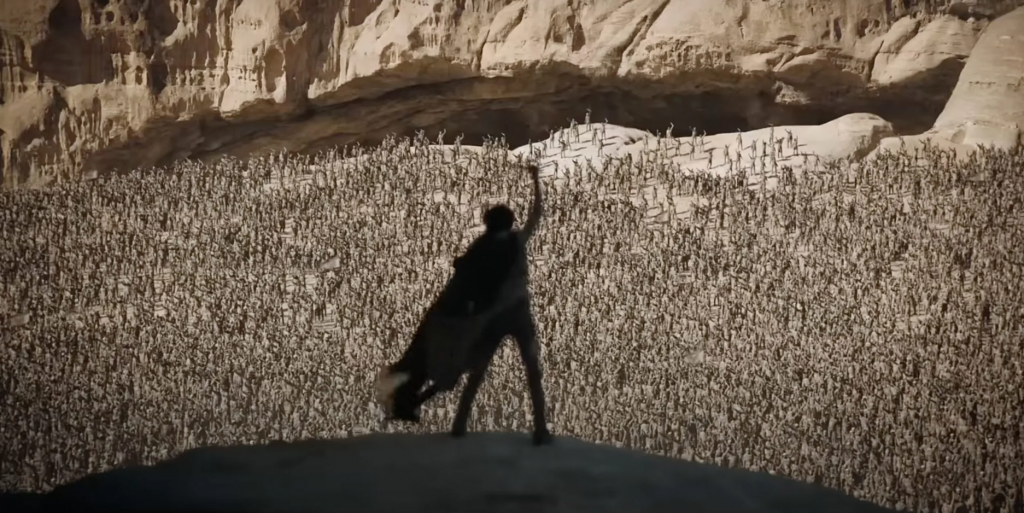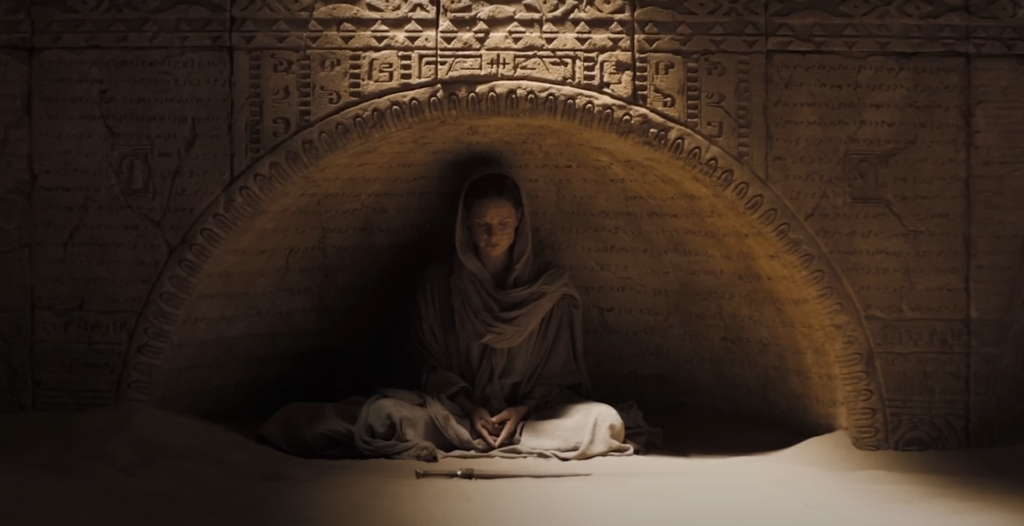Dune 2 is a fantastic movie, one I would put up next to Oppenheimer any day of the week. Now that Oppenheimer has won best picture, it’s clear how highly I think of that film. Having read the book, I knew that going in that the Dune universe wasn’t big on fundamentalism, but I never got the sense that it was explicitly anti-religion as its central point. It is against hero worship, but religion remains enigmatic. While watching Dune 2, and even during the drive home, I had this urge to worship like a Fremen. I’m not and never have been a fundamentalist, so why did I yearn to join them on my knees, in the hot sand, in worship?
While watching Dune 2, and during the drive home, I had the urge to worship, and even fight, along side the Fremen. I’m not and never have been a fundamentalist, so why did I yearn to join them on my knees, in the hot sand, in worship?
This is especially surprising given the perceived anti-religion perspective that is attributed to Herbert and his Dune series. How could such a strong religious vibe be created by such a narrative.?
Low information folks are taking this big movie as an opportunity to convict all religion, using the false prophet and the power manipulations of the Bene Gesserit.
However, a casual search on the internet shows that Herbert is not anti religious:
What I’m saying in my books boils down to this: Mine religion for what is good and avoid what is deleterious. Don’t condemn people who need it. Be very careful when that need becomes fanatical.”
– Frank Herbert, “Conversations in Port Townsend
From my brief searches I found that he had overbearing Catholic aunts who may have pushed too hard. According to this:
Herbert was raised Catholic before converting to Zen Buddhism, but there are several religious theologies including Christianity, Judaism, Navajo and Islam he has appropriated in the novel or reworked to create new religions that play a significant role in the evolution of this feudal society.
The movie has a significantly different take on the character of Chani, which apparently borrows from the sequel, Dune Messiah. It turns out that Herbert was disappointed in the people loving Paul, but there is a point one must make when the interpretation of art is as valid as the artist’s intent. Chani’s role is more of the rational voice in a sea of religious fervor. Ultimately, we can take the work independently, without the author’s intent, and have a more informative conversation.
As a Christian, I felt deeply connected to the religious themes, perhaps even more than in the book. The enormous power of worship and the power of a Messianic person to come and save you from an oppressor are so powerful.

It wasn’t just when they prayed that I felt this urge. It was Lady Jessica (the incredible Rebecca Ferguson), the movements of the Bene Gesserit, the voice they used to compel movement. When Paul shows his dominance over Reverend Mother Gaius Helen Mohiam by using the voice, we see her surprise at the true Messiah. Did she not believe, or didn’t want to admit her very eyes? This seems very similar to that of the Pharisees of Jesus’s time. They looked for a warrior but instead came a lamb. Those who saw who Jesus was probably converted to the new “Nazarenes” movement, which in 300 years would then convert the highest ruler in the land, Constantine the Great.

The Catholics had a great opinion of the movie, while perhaps understandably, some Muslims weren’t as excited about it. I don’t think they should be concerned. I had the strangest feeling during and after that movie – I was envious of the fundamentalists who really believed and would die for it. For a moment, I wanted to experience what I’ve seen of Muslim worship if only to see what it would feel like. But, of course, that’s ridiculous. As a person of European descent with catholic lineage, I could no longer think that as I could feel any Hindu or Buddhist rite.
Being a contemporary Christian is better than any time prior – we don’t have Crusades or wars for religion and for the most part we don’t govern (and shouldn’t want to) which is nice. We can (should) love others despite borders, languages, or culture. We love those who can do nothing for us, and ask nothing in return.
Yet, sometimes I yearn for the fervor I see in some Muslim communities and on the screen for Fremen.
I know that of course the Bene Gesserit manipulated them and so on, but the raw power of faith was there on the screen. The last time I felt anything like that was a few years back when I visited Rome and was sacked (pun intended) by St. Peter’s Basilica. I wasn’t prepared for the inside of that building and I can get chills thinking about it even today.
Religions have the unfortunate problem of being performed by humans, which means that whatever happens, its not going to be perfect, or always good. Evil can put on the cloak, read the books, and say the words, but it is by its fruit that we know.
The believers back in Jesus’ day wanted a savior that would come and destroy their oppressors. Jesus beat strength with weakness. He was no Paul Atredies, not a a warrior king, or conqueror.
Jesus wasn’t a fundamentalist. He didn’t stop Thomas from touching his wound after he was raised. Doubt wasn’t forbidden by our Lord and shouldn’t be by those who claim to follow Him.
In our modern times, we die without purpose. We live our life, make money for us and our loved ones, while serving the System that grinds us to bone and dust. We don’t die for a cause, for a purpose, for the great coming of God. We drop to the ground like a bird, uncelebrated, and purposeless.
But the Freman who dies on that field may die younger, but at least he dies for something.
Don’t get me wrong. I ‘m not speaking in favor of zealousness or fundamentalism. War is a great evil, and its reduction in our world has been nothing short of the Holy Spirit’s miracle.
If Herbert’s message helps with peeling off some of the cult of personality from political leaders, then all the better. Not questioning powerful leaders is of particular importance if you look at the current US election.
But where is the heart, the heat of Christ right now? Perhaps I should look in the mirror and at the texts and communities that I’m now part of as an Episcopalian and ask: Is this food bringing the raw power of faith to my life? What is my role in opening up to this tradition that I’m new to?
In short, how can I believe with the intensity of a Freman while soaking in a skeptical, over-rational, dualistically-minded 21st-century culture? My conversation on Letterboxd with Jeff Overstreet, Christian Media Critic, sums up this tension nicely:
ME:
To my great surprise, I (briefly) yearned to join the militant believers during this movie and sometime after. I’m not a fundamentalist, but Dune 2 gave me that raw power of unquestioning faith viscerally. In the West, we’re very cerebral about our faith through the necessity of being in a critical age. I have very nuanced views that have morphed as I grew as a Christian. But it’s all head, no heart. Part of me wanted to feel what the Fremen felt, that overwhelming belief that grabs all of you. I am seeking out this experience, but where do I find it?
I get that Dune’s message is against the cult of personality and fundamentalism. Still, I can’t shake the feeling that the modern Christian experience is missing something. When I recall the feeling I got as the Fremen army took to the sand dunes to liberate their world, the most fitting, and disconcerting, word that comes to mind is elation
JEFF:
“I think I understand what you’re saying. I have felt that zeal in several seasons of my life. In retrospect, I find that in most cases there was a vein of unhealthy arrogance involved, but I don’t think that’s necessarily inevitable. If the zeal is characterized by humility, by a healthy suspicion of one’s own convictions, and by joy rather than anger or judgment, then that sounds to me like the Holy Spirit. Zealous fundamentalism rarely bears “the fruit of the spirit”: love, joy, peace, patience, kindness, generosity, faithfulness, gentleness, and self-control. Jesus was an exemplar of all of these things with the conviction and charisma that inspired a following. But note: Whenever the disciples wanted to say “THIS! THIS IS IT! LET’S BUILD A TEMPLE AROUND THIS MAN AND THIS SET OF BELIEFS!” he rejected their proposal and kept moving. The zeal has to be the journey of constant discovery and humility and revision, not of certifying a checklist of certainties and defending them. Does that make sense?
This is very, very difficult for anyone — including Christians. We all want the feeling of certainty that we are “on the good side” or “in the right camp.” But whenever the disciples start acting or talking that way, Jesus does something that absolutely confounds and disorients them.
One of my favorite lyrics in all of music comes from Over the Rhine’s song “The World Can Wait”: “And like all true believers / I am truly skeptical of all that I have said….”
…I resonate with your position. For it to be a durable faith, a the Christian needs to find zeal through continual discovery and learning. I’ve been a Christian for decades and still don’t feel like I have it down. It’s like Maya Angelou’s quote
“I’m always amazed when people walk up to me and say, ‘I’m a Christian.’ I think, ‘Already? You already got it?’
Rohr’s work Falling Upward covers this topic extensively. One of my favorite lines from it is this quote
“Sin happens whenever we refuse to keep growing.”
– Richard Rohr
Dune has unlocked a lot of questions and emotions for me, and we’re about to go into a second viewing of it this week. I wonder if my feeling will be different.
BTW if you want to check out Mr. Overstreet’s excellent work, you’ll find it here.
